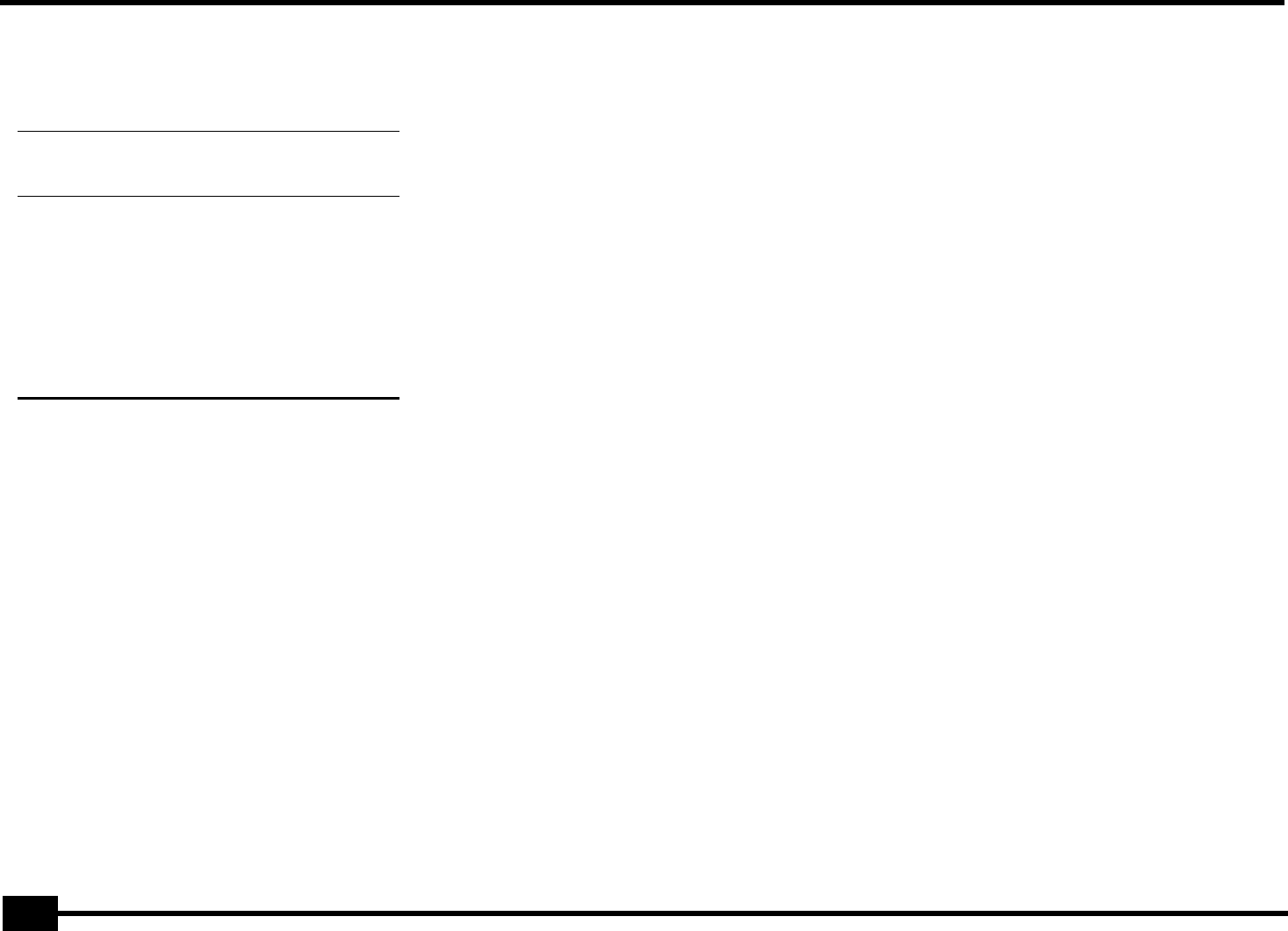
r
E-200/E-100
44
Please note that synchronization is only possible when you
connect the external device’s MIDI OUT socket to the E-200/
E-100’s MIDI IN socket (though you can also work the other
way around; in that case, see the sequencer’s manual for
details).
■
Style PC° (Style Select TxRx Channel)
(OFF, 1~16, Default setting: 10) As its name implies, the Style
Select channel is used to receive and transmit program
changes that cause the E-200/E-100 or the external instrument
to select another Music Style.
■
Lyrics Tx° (Transmit Lyrics messages)
(On/Off, Default setting: Off) The E-200/E-100 can transmit
Lyrics messages contained in Format 0 Standard MIDI Files you
play back. It cannot display them, but it allows you to transmit
them to a device capable of displaying Lyrics messages (such as
the Roland LVC-1). This filter allows you to enable (On) or dis-
able (Off) the transmission of Lyrics data.
■
NTA Rx14° (Note-to-Arranger reception on/off)
(On/Off, Default setting: On) NTA is short for “Note-to-
Arranger”, or the notes you play in the left half of the keyboard
to feed the Arranger with chord information. These notes can
also be received via MIDI (from an accordion, a digital piano, an
organ, for example). If you want to use the Arranger without
playing on the E-200/E-100’s keyboard, you must transmit
these notes on MIDI channel 14 (from your computer or exter-
nal MIDI instrument to the E-200/E-100) and select “On” here.
NTA notes can only be received (they are not transmitted). The
notes you play on the E-200/E-100’s keyboard are indeed
transmitted to the Arranger, from there to the Arranger parts,
and used to play the accompaniment in the right key. Since all
Music Style notes are transmitted via MIDI, there is no need to
send the NTA notes separately.
■
PitchBnd° (Pitch Bend)
(On/Off, Default setting: On) This filter allows you to enable
(On) or disable (Off) the transmission and reception of Pitch
Bend messages. These messages are used to temporarily
increase or decrease the pitch of the Keyboard-part notes
(Main, Dual, Split).
■
Modulatn° (Modulation)
(On/Off, Default setting: On) This filter allows you to enable
(On) or disable (Off) the transmission and reception of Modula-
tion messages. These messages are used to add vibrato to the
notes you play (control change CC01).
■
ProgChng° (Program Change)
(On/Off, Default setting: On) This filter allows you to enable
(On) or disable (Off) the transmission and reception of Program
Change messages. These messages are used to select Tones,
Styles, or User Programs.
■
Velo Rx° (Receive Velocity)
(On, 1~127, Default setting: On) This filter allows you to enable
(On) or disable the reception of velocity messages. This only
applies to note messages received via MIDI. Choose the velocity
value to be substituted for the actual values the E-200/E-100
receives (1~127), or select “On” to use the velocity values as is.
■
Clock Tx° (synchronization)
(On/Off, Default setting: On) This parameter allows you to
determine whether (On) or not (Off) the Arranger and Recorder
send MIDI Clock messages when you start them. These mes-
sages are necessary for synchronizing external MIDI instru-
ments/sequencers/software to the E-200/E-100.
■
StartStp° (Start/Stop/Continue)
(On/Off, Default setting: On) This option allows you to specify
whether or not the Arranger and Recorder send Start/Stop/
Continue messages when you start or stop them. Select “Off”
when you wish to control the tone generator of a MIDI organ,
etc., without starting or stopping its automatic accompani-
ment.
■
Song PosP° (Song Position Pointer)
(On/Off, Default setting: On) The E-200/E-100’s Recorder also
sends and receives Song Position Pointer messages that indi-
cate the exact location of the notes that are being played back.
Select “OFF” if you don’t want the Recorder to send or receive
these messages.
Off In this case, the E-200/E-100 is not synchronized with
other MIDI devices. It is thus impossible to start/stop it
via MIDI.
On Arranger playback and Song recording/playback are
synchronized if the E-200/E-100 receives MIDI Start
and Stop messages followed by MIDI Clock signals. If
the E-200/E-100 receives only a Start message, it will
wait a moment to see if there are also MIDI Clock mes-
sages coming.
If there are, it will synchronize to them. If there are no
MIDI Clock messages, it will follow its own tempo. In
either case, you can stop playback or recording with a
MIDI Stop message.
E-200_US Page 44 Tuesday, January 27, 2004 4:01 PM


















